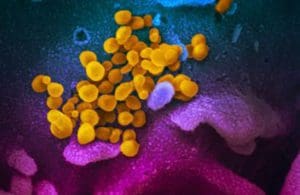
A scanning electron microscope image shows SARS-CoV-2 (yellow). Credit: NIAID-RML
Experts have theorized that mucosal vaccines, which could be administered nasally, orally or transdermally, could alter the trajectory of the pandemic. But a recent setback involving an intranasal version of AstraZeneca’s ChAdOx1 nCoV-19 COVID-19 has dampened those hopes.
A Phase 1 study published on Lancet’s eBioMedicine found that intranasal vaccination was detectable in a minority of participants. Intramuscular vaccination with the ChAdOx1 generally led to more robust systemic responses than the intranasal vaccine.
The open-label partially-randomized study did find that participants had antigen-specific antibodies after receiving an intramuscular mRNA vaccination following the administration of the intranasal vaccination.
The vaccine was well tolerated in the study.
Seven of the 42 volunteers in the trial, however, became infected with COVID-19 within 16 weeks of follow-up.
“This formulation of intranasal ChAdOx1 nCoV-19 showed an acceptable tolerability profile but induced neither a consistent mucosal antibody response nor a strong systemic response,” the study authors concluded.
While intranasal vaccines could potentially provide mucosal immunity, it is also possible that recipients of the vaccine can swallow a portion of it, rendering it less effective.
Scientists involved in the aforementioned Phase 1 study will abandon plans to continue exploring that iteration of the intranasal vaccine.
Future intranasal vaccines could be engineered to ensure that the majority of the vaccine remains in the upper airways.
There are several nasal COVID-19 vaccine candidates in development. Several of those vaccines are in Phase 3 trials. In addition, Razi Vaccine and Serum Research Institute are developing a protein subunit nasal vaccine. Meanwhile, Codagenix is developing a live-attenuated intranasal vaccine.
Bharat Biotech’s intranasal vaccine has won approval in India. It is also the focus of a Phase 3 study.
China has approved an intranasal vaccine from CanSino.
AstraZeneca, which funded the study, saw its shares tick down 0.22% to £9,804.00.
Last week, FDA announced in a factsheet for AstraZeneca’s COVID-19 antibody Evusheld that the product may not be effective against the BA.4.6 subvariant.
Filed Under: Infectious Disease



